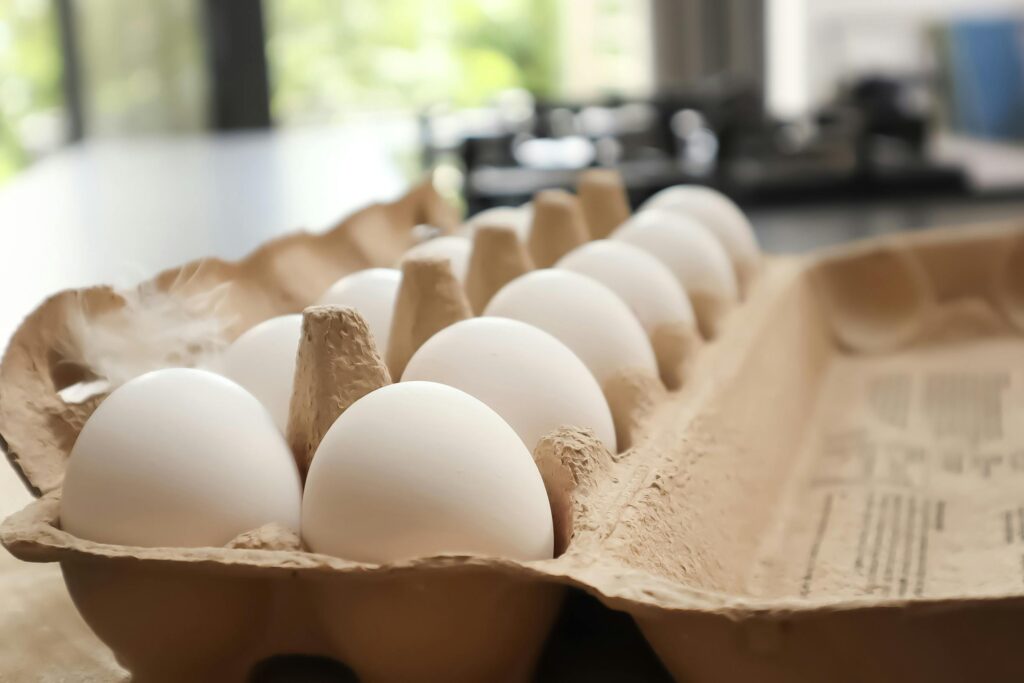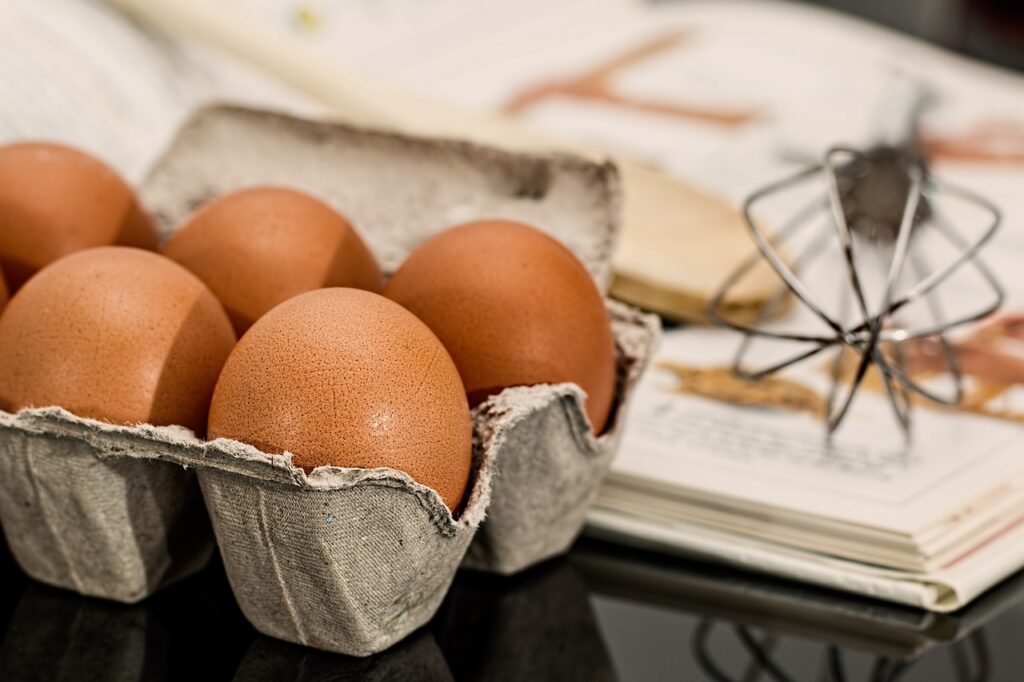Introduction: Understanding Egg Freshness
Freshness isn’t just a label—it’s a critical factor in egg safety and usability. An egg’s age affects not only its taste but also its texture and nutrient quality. In general, eggs are considered “fresh” for the first 21 days after being laid, but their exact shelf life varies depending on how they’re stored and whether they’re washed.

Image by freepik
Key Indicators of Freshness:
- Firm yolk and thick egg white when cracked.
- No foul odor.
- Egg floats? Likely not fresh. A fresh egg sinks.
Understanding these characteristics will help you determine how long you can safely leave eggs on the counter.
Washed vs. Unwashed Eggs
One of the most important distinctions when it comes to egg storage is whether or not the eggs have been washed.
| Egg Type | Washed | Shelf Life on Counter | Notes |
| Store-bought (U.S.) | Yes | Not Recommended | Lacks natural protective coating |
| Farm-fresh (Unwashed) | No | Up to 3 weeks | Retains bloom protection |
Unwashed eggs have a natural coating called the cuticle or “bloom,” which acts as a barrier against bacteria. Washing removes this, which is why U.S. grocery store eggs must be refrigerated immediately.
Average Counter Lifespan of Chicken Eggs
Unwashed, freshly laid eggs can last up to 3 weeks safely at room temperature, provided they’re stored properly (out of sunlight, in a stable environment).
Shelf Life Summary (Approximate):
- Unwashed farm eggs: 2–3 weeks on the counter, 3 months in the fridge.
- Washed eggs: Must be refrigerated immediately; 4–5 weeks in fridge.
Pro tip: Store eggs pointy side down to keep the yolk centered and reduce air exchange.
Factors That Affect Egg Shelf Life
Several environmental and handling factors influence how long eggs can sit out safely.
Environmental:
- Temperature: Ideal range is 50°F–68°F (10°C–20°C).
- Humidity: High humidity promotes bacterial growth.
- Air circulation: Stagnant air can raise the temperature.
Handling:
- Frequent touching can wear off bloom.
- Cracks or microfractures reduce shelf life drastically.
- Nest box hygiene is essential for initial cleanliness.
Keep your eggs in a cool, dark place, preferably in an egg carton to shield from light and reduce moisture exchange.

Photo by Sarah Chai
Signs of Spoiled Eggs
Knowing how to identify spoiled eggs is critical to avoid foodborne illnesses like salmonella.
Visual Checks:
- Discoloration in yolk or white.
- Powdery or slimy shell indicates mold or bacteria.
Smell Test:
- A rotten egg smells distinctly sulfuric—you’ll know it instantly.
Float Test:
- Fill a bowl with water and place the egg inside:
- Sinks & lays flat: Fresh.
- Stands upright: Older but usable.
- Floats: Likely spoiled.
- Sinks & lays flat: Fresh.
Always err on the side of caution. If in doubt, toss it out.
The Science Behind Egg Bloom
The bloom or cuticle is a protein-based layer deposited on the shell as the egg is laid. It’s the egg’s first line of defense against bacteria like Salmonella enteritidis.
This is why European countries often don’t refrigerate eggs—they rely on unwashed eggs with the bloom intact. In contrast, the U.S. requires eggs to be washed for retail, stripping this natural layer and making refrigeration a must.
Country Regulations: U.S. vs. Europe
| Region | Egg Washing | Refrigeration Required | Common Practice |
| United States | Required | Yes | Wash & chill |
| European Union | Prohibited | No | Don’t wash, store at room temp |
Different regulations create different expectations. In the U.S., consumers expect cold eggs; in Europe, they expect room-temperature storage.
Best Practices for Storing Eggs at Room Temperature
If you’re storing eggs on the counter, you’ll want to follow strict handling rules:
- Keep away from sunlight and heat sources.
- Don’t stack eggs too high—cracks kill shelf life.
- Use an egg skelter to rotate the oldest eggs forward.
- Label each egg with the date laid.
Tip: Use eggs within 3 weeks for maximum freshness and safety.

Photo by Teun Nijn
How Long Do Farm-Fresh Eggs Last on the Counter?
Farm-fresh, unwashed eggs have the highest room-temperature longevity. When collected properly and stored in a dry, clean environment:
- Shelf life: 14–21 days on the counter.
- Cool storage (50–60°F) can extend this to 30+ days.
If you’re unsure of your home’s temperature consistency, refrigeration might be the safer option.
Refrigeration vs. Room Temp: Pros & Cons
| Storage | Pros | Cons |
| Room Temp | No energy use, easy access, natural process | Shorter lifespan, temperature sensitive |
| Fridge | Longer shelf life (5–7 weeks), safer for washed eggs | Alters egg structure over time, condensation risk |
Verdict: Use room temp for unwashed farm eggs, refrigeration for washed or commercial eggs.
Safety Tips for Handling Room Temp Eggs
- Always wash hands before and after touching eggs.
- Don’t refrigerate room-temp eggs that have sat out too long.
- Never use cracked eggs, even if they look or smell fine.
- Avoid using raw eggs in uncooked dishes unless pasteurized.
Following these simple rules will greatly reduce the risk of illness.
How to Extend Counter Shelf Life Naturally
You can prolong the life of your unwashed eggs with some easy techniques:
- Apply food-grade mineral oil: Mimics the bloom.
- Store eggs in a ceramic or earthenware crock with a breathable cover.
- Keep them in a pantry or root cellar with consistent, cool temperature.
These methods were used for centuries before refrigeration existed.
When to Refrigerate: Transitioning Eggs Indoors
Sometimes, you’ll want to switch from countertop to cold storage—especially in hot weather.
- Do it before they’ve reached their 3-week shelf limit.
- Let them cool naturally—don’t refrigerate warm eggs.
- Once refrigerated, don’t return to room temp.
This helps prevent condensation, which can draw bacteria into the shell.
Myth-Busting: Common Misconceptions
- Myth: “Eggs go bad after a few days unrefrigerated.”
- Truth: Unwashed eggs can last weeks at room temp.
- Truth: Unwashed eggs can last weeks at room temp.
- Myth: “Washing makes them cleaner and better.”
- Truth: Washing removes protective bloom.
- Truth: Washing removes protective bloom.
- Myth: “Float test always confirms spoilage.”
- Truth: It indicates age, not contamination.
- Truth: It indicates age, not contamination.
Stay informed and rely on a mix of tests for accuracy.
FAQs
Q1: Can I store store-bought eggs on the counter?
A1: No, store-bought eggs in the U.S. are washed and must be refrigerated due to the removed bloom.
Q2: What’s the best temperature range for room temp storage?
A2: Between 50°F and 68°F (10°C–20°C) with minimal fluctuation.
Q3: Can I rewash unwashed eggs before cooking?
A3: Yes, but only just before use to avoid moisture-related bacterial growth.
Q4: Can I apply oil to washed eggs?
A4: You can, but it’s less effective than preserving the natural bloom.
Q5: How do I know if my room-temp eggs are still good?
A5: Use the float test, sniff test, and check for shell integrity.
Q6: Do eggs go bad faster in the summer?
A6: Yes, especially in warm or humid climates. Use a thermometer to monitor storage spots.

Image by Steve Buissinne from Pixabay
Conclusion
So, how long do chicken eggs last on the counter? If unwashed and stored right—up to 3 weeks. The key is knowing whether your eggs are washed, understanding the role of bloom, and recognizing signs of spoilage. With the right storage practices, you can keep your eggs safe, fresh, and ready to enjoy, no fridge needed.
